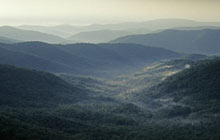
It was just before noon, 10 miles outside Birmingham, Alabama, that the bomb threat was called in. I was in the bar car, sipping a Coke, when the train screeched to a halt and a stewardess rushed in. "A small emergency, sir. Please exit the train."
"What's up?"
"Nothing," she said. "Just a call that there may be a bomb on board."
I looked outside. The southern sun beat down on a dusty railroad town called Irondale. I was struck with a horrific thought: this is it, I'm going to go up in a giant fireball out here in Nowheresville, Alabama. Then a second thought came to me and calmed me down: I've never been to Alabama. This was as good a time as any to see it. I gathered my bags and joined 200 fellow passengers in the Irondale dust, awaiting a bomb squad.
It was a scorching Saturday in mid-August, the second day of my week-long rail journey from New York to Los Angeles. When most of us think of travelling across the US we think of taking a car, and indeed just such a road trip had long been a dream of mine. But at home in New York I had a young daughter and a seven-months' pregnant wife. The chances of me travelling across the US at all in the next 18 years were fading fast. Then I remembered Amtrak. America's federally run rail service has more than two dozen routes around the country, and I discovered that you can travel from New York to LA in four days, having to change trains only once.
I pleaded with my wife to let me do it. "You've got a week," she relented. "Keep your phone on in case this kid comes early."
There were two possible ways to go: north, via Chicago, and across the midwest plains; or south, taking Amtrak's Crescent service from New York's Penn Station to New Orleans (27 hours), and connecting to the Sunset Limited, the oldest continually operating train in the US, a 44-hour journey from New Orleans to LA through the deserts of Texas, New Mexico and Arizona. I chose the south. Not only because I could stop over in New Orleans, but one look at the route evoked old blues songs, country music, and classic westerns: Tuscaloosa, El Paso, Tucson, Yuma. I booked a first-class sleeper cabin on each train and, settling on El Paso as my second stopover – is there a more quintessential wild west town? – set off to see America.
Amtrak has its detractors. The national rail service was cobbled together in 1971 from the fading passenger operations of the major freight railroads. In 38 years it has never run at a profit and is derided by many Americans as slow and over-priced, with poor customer service. I love trains, though, and I was happy to reserve judgment.
We pulled out of Penn at 2.15pm. My sleeper was small but comfortable. It had a bunk, two facing seats that can become a second bed, and a sink that flipped down over a poky toilet. A steward came through to ask what time I wanted dinner. I dozed off as New York's skyscrapers gave way to New Jersey smokestacks and Pennsylvanian forest. It must have been very comfortable, for I awoke at dusk, somewhere in Virginia, having slept through Philly, Baltimore, and DC. It was time for dinner and a cocktail.
And here, I admit, the romance faded a little. In my enthusiasm I had imagined the Crescent to be a faded American version of the Orient Express, or at least as stylish as the Eurostar. Ultimately, though, it's a no-frills commuter train. The bar car needed reupholstering, the dining car smelled of fried fish, and the middle-aged woman in charge bossed me around like a canteen matron scolding a school kid. Plus it was overbooked.
"Is this the first-class dining car?" I protested as she shoved me into a booth.
"Only one dining car on the train, darlin'," she snapped, tossing me a menu.
I ordered the short ribs (pretty good) and a mini bottle of merlot (not so good), and dreamed up a new marketing strategy for Amtrak: tuxedoed bartenders serving martinis; plush lounge cars with poker tables and burlesque dancers. Heck, maybe even a cinema car.
"It's good but it ain't like grandma's," mumbled a voice opposite me. I woke from my reverie. An elderly African-American gentleman was tucking into his fried chicken. His name was Turner King and he was on his way to see his sister in Atlanta, Georgia, the train's next major stop, where we were due in at 8am. I asked him why he hadn't flown: a plane would have taken one hour, maybe two; Atlanta was 16 hours away.
"Planes fallin' out the sky like stones these days. We safer on the ground."
 Blue Ridge Parkway, North Carolina. Photograph: Alamy
Blue Ridge Parkway, North Carolina. Photograph: Alamy Around midnight I went back to my cabin. North Carolina rolled past, its moonlit fields haunted with the ghosts of civil war soldiers. I felt the train strain as it eased through the Blue Ridge foothills. Ten hours later I awoke, annoyed to discover that I had missed the last breakfast call because the public address system was broken.
